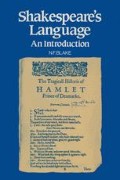Abstract
In the last chapter we saw that Shakespeare’s response to the prevailing linguistic attitudes was to indulge in linguistic expressiveness involving wit and sound, and it it possible that these aspects of language were more important to him than the moulding of language to suit the requirements of individual characters. In his plays he used rather a narrow range of the linguistic possibilities of the English of his time so that it is sometimes difficult to identify from a given passage who the speaker is, for few characters in his works have idiosyncrasies which mark them out from all others. Even if a character like Dogberry uses malapropism, his malapropisms are no different in kind from those used by others. Some scholars have tried to isolate certain features of syntax as characteristic of particular characters or even whole plays, such as the interrogatives in King Richard the Second and the conditionals used particularly by Falstaff in The First Part of King Henry the Fourth.1 However, in such plays those syntactic features are simply found more frequently than in the other plays and can be detected only through comparison of large stretches of text. Such differences are more subtle than marked features of vocabulary or dialect and can readily be overlooked, particularly in the theatre.
Preview
Unable to display preview. Download preview PDF.
Notes
See for example Dolores M. Burton, Shakespeare’s Grammatical Style (Austin and London: University of Texas Press, 1973).
K. Muir, ‘Shakespeare and Rhetoric’, Shakespeare Jahrbuch 90 (1964) 60; and Kenneth Hudson, ‘Shakespeare’s use of Colloquial Language’, SS 23 (1970) 39–48.
K. Muir, ‘Shakespeare and Rhetoric’, Shakespeare Jahrbuch 90 (1964) 60; and Kenneth Hudson, ‘Shakespeare’s use of Colloquial Language’, SS 23 (1970) 39–48.
A. R. Humphreys (ed.), The First Part of King Henry IV, 6th edn (London: Methuen, 1966) p. 37.
P. J. Gillett, ‘Me, U, and Non-U: Class Connotations of Two Shakespearean Idioms’, Shakespeare Quarterly, 25 (1974) 297–309.
Author information
Authors and Affiliations
Copyright information
© 1983 N. F. Blake
About this chapter
Cite this chapter
Blake, N.F. (1983). Varieties. In: Shakespeare’s Language. Palgrave, London. https://doi.org/10.1007/978-1-349-17051-7_3
Download citation
DOI: https://doi.org/10.1007/978-1-349-17051-7_3
Publisher Name: Palgrave, London
Print ISBN: 978-0-333-28639-5
Online ISBN: 978-1-349-17051-7
eBook Packages: Palgrave Literature & Performing Arts CollectionLiterature, Cultural and Media Studies (R0)

